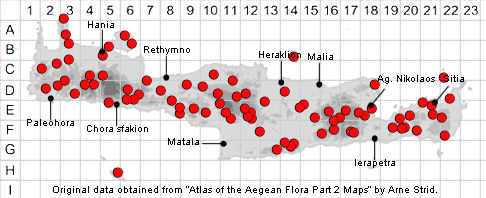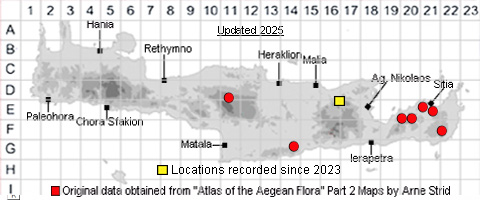SPECIES DESCRIPTION
VERONICA CYMBALARIA
Including Veronica trichadena
Family and Genus:- See- PLANTAGINACEAE/Sect. POCILLA
Common Names:- Cymbalaria-leaved speedwell, Pale speedwell.
Homotypic Synonyms:- Cochlidiosperma cymbalaria, Pocilla cymbalaria.
Meaning:- Veronica (L) For Saint Veronica, who wiped the sweat from Christ's
face.
Cymbalaria (L) Cymbal-like (reference to the leaves).
General description:- Slender annual, usually sparingly branched from the base
with decumbent stems.
Stems:-
1) Sparsely pilose 10-30 cm, broadly ovate, ± procumbent, the entire cotyledons
often retained at anthesis.
Leaves:-
1) Rather long-petiolate, all but the lowermost alternate, the lowest opposite.
2) Blade, 6-18 mm, broadly ovate to orbicular or reniform, shallowly lobed or
coarsely crenate, thin, light green, subglabrous.
3) Pedicels, much exceeding leaves.
Flowers:-
1) 4 petalled, solitary in the leaf axils.
2) Fruiting pedicels, exceeding thee subtending leaf, often patent or recurved.
3) Calyx segments, broadly elliptical to suborbicular, patent in fruit.
4) Calyx teeth and capsule, with long and coarse, glandular and eglandular hairs up
to 2 mm.
5) Corolla, 6-10 mm in diam., white.
6) Sepals, cordate, at the the base.
7) Style, c. 1·5 mm.
Fruit:-
1) Capsule, c. 3 x 4 mm, shallowly 2-lobed, ciliate.
2) Seeds, c. 4, large, (2-2.5 mm), subglobose, deeply excavate on one side.
Key features:-
1) Flowers, in terminal racemes (sometimes also in axillary racemes below the
terminal) or solitary in leaf-axils.
2) Stems, ± procumbent.
3) Seeds, at least 2 mm.
4) Leaves, 5- to 9-lobed.
5) Calyx-segments, obovate, obtuse.
6) Capsule, ciliate.
Habitat:- Gravelly beaches, culitaved and fallow fields, rock ledges in gorges,
orchards, stone walls of buildings. 0-800 m. occasionally to 1500 m. in dolines.
Distribution:- Widespread in the Mediterranean regiom. Widespread and common
on Crete.
Flowering time:- Mainly Mar-May.
Photos by:- Steve Lenton
VERONICA TRICHADENA
Synonyms:- Cochlidiosperma trichadena, Veronica cymbalaria subsp.
trichadena.
Meaning:- Trichodena (Gr) With hairy glands.
Resembling Veronica cymbalaria, but differering in the following characters.
1) Generally smaller.
2) Leaf blade 6-13 mm, shallowly crenate to subentire, usually glandular-pubescent.
3) Fruiting pedicels scarcely exceeding the subtending leaf.
4) Calyx segments shortly glandular-pubescent.
5) Capsule with glandular and eglandular hairs, generally less than 1 mm.
Habitat:- Rocky slopes, gorges, cliff ledges, field margins. (200-)500-1200 m.
Distribution:- Scattered in the Mediterranean region from the Balearic Islands to
SW Anatolia. Rare on Crete known from only a few locations in the Sitia area and
two elsewhere.
Flowering time:- Mar-June
Photos by:- Fotis Samaritakis
~~~~~~~~~~~~~~~~~~~~~~~~~~~~~~~~~~~~~~~~~~~~~~~~~~~~

